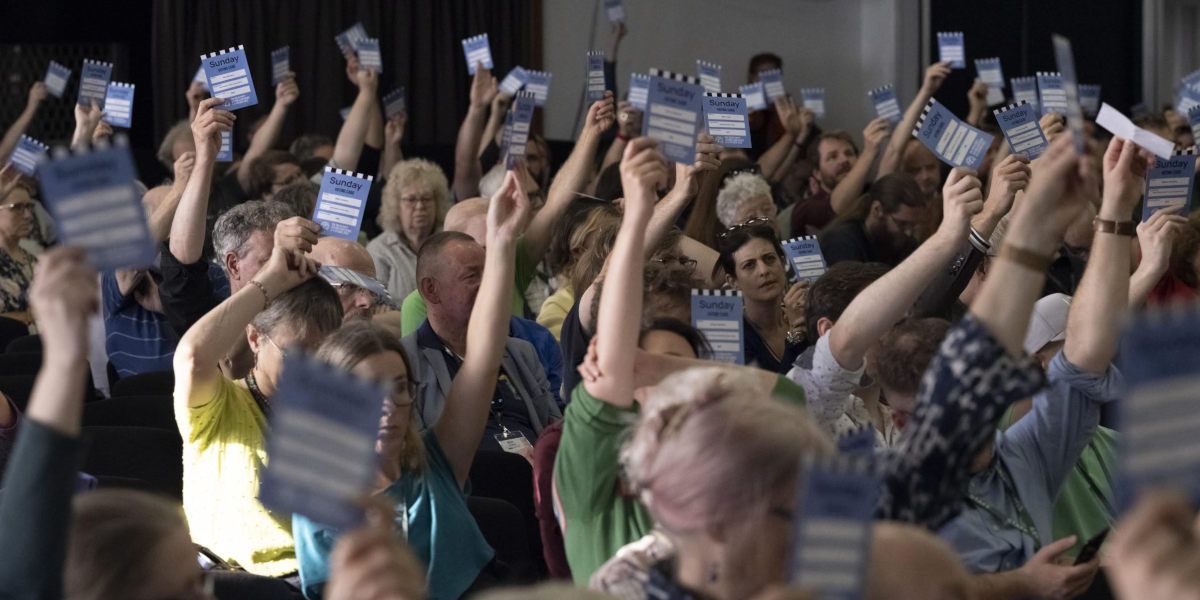Summer 2025 has been brimming with activity aimed at building a radical left, independent of a right-wing Labour Party. Zack Polanski’s ‘eco-populist’ campaign for Green Party leadership – with results due on 2 September – has driven a surge in Party membership. His media performances attacking billionaires have cut through for many. The ‘Your Party’ project, co-founded by Zarah Sultana and Jeremy Corbyn, meanwhile gained over 700,000 supporters within a week of its launch. Sultana’s earlier ‘soft launch’ tweet was read by over 8 million people.
Polanski and ‘Your Party’ are tapping into popular disillusionment with the political establishment, particularly the two main parties. The trio clearly have the potential to push thousands into action – so far only paying the Green Party £5 a month or registering an email address on a website. Yet currently, both political projects lack focused extra-parliamentary and deep grassroots organising in communities and workplaces. Without it, they will face the limits of electoralism. In order to succeed, they must turn signing up into showing up.
Legislation from below
Jonas Marvin argues that a key ingredient for left party success is ‘to create a generation of working class organisers inside and outside of official politics’. This ‘legislation from below’ could take the form of helping to organise striking workers, working with tenants unions or supporting Palestine solidarity activists – for example by backing their demands for councils to divest from genocide. Such a politics contributes to localised power bases and struggles that meet the material needs of working-class communities.
We have started to focus on these needs in the Lewisham Green party. After defecting from Labour, one of my first acts as leader of the Lewisham Council Green group was tabling such a pensions divestment motion. We later held a public workshop to hear residents’ priorities, and these will shape our council elections manifesto next year. We plan to hold more workshops, asking what diverse communities want from Green councillors and how we can better support existing community action. This could encourage new Green councillor candidates to step forwards. At present, the inaccessible, discriminatory and opaque nature of party politics excludes many activists from finding a political voice.
The populist paradox
For these initiatives to have a positive impact on the local elections next May, we have to be active right now. This reality poses a problem for ‘Your Party’, which will be spending the autumn planning its conference, deciding what to call itself and how it will be structured as a party. Meanwhile, its 700,000+ supporters will be waiting for something to happen – as a Polanski-led Green party is attempting to shape the political weather.
One of left populism’s greatest strengths – for a leader to act as a lightning rod for radical change – is also its biggest weakness. While figureheads are crucial for rallying a constituency of support, they can also have a demobilising effect where supporters become passive cheerleaders. At that point, political action is reduced to internal voting, online activism, endless WhatsApp chats, meetings and canvassing, and focus on national over local issues.
While all important, none of these activities allow for activists and supporters to express their agency – all are left waiting for the leader(s). People are tired of having politics ‘done to them’. It’s time for a politics of self-organisation.
Look to communities, not Westminster
Polanski’s opponents in his leadership bid, MPs Ellie Chowns and Adrian Ramsey, insist that the Greens need leaders who are in parliament. They misunderstand the fact that most people care far more about what’s happening within their immediate environment than in Westminster. While Polanski’s solo candidacy risks falling into the same trap of Corbynism 1.0, his combative media appearances and DIY videos see him confront inequality, climate breakdown and justice for underpaid migrant workers.
Another figure with a similarly direct approach is the deputy leadership hopeful, Gipton and Harehills Councillor Mothin Ali. A working-class British-Bangladeshi from Yorkshire, Ali unseated a 17-year Labour incumbent on a pro-Gaza ticket in Leeds last year, overturning a 3,000+ majority. Soon after, he was dubbed ‘the hero of Harehills’ after putting his body on the line to diffuse tensions when unrest started in his ward. Outspoken about his passion for permaculture, Ali has built a community garden and was recently seen confronting fascists on the streets of Leeds outside Home Office accommodation for people seeking asylum. Beyond representation, Ali’s campaigning, anti-racism and community organising offers a blueprint for how the Greens – and other left parties – can win in traditional Labour strongholds.
A red-green alliance?
The decisive shift to an Ali and Polanski Green Party leadership would align, not conflict with the embryonic Corbyn-Sultana party. As it stands, both Polanski and Corbyn have suggested their parties will collaborate – but have not committed to an alliance. With an engaged membership, over 800 councillors, established party structures and a leftward trajectory, the Greens should be more than junior partners in such an alliance.
In any case, and whether voters end up with locally agreed pacts or formalised co-endorsements, a left bloc akin to the New Popular Front in France could win councils and create a significant caucus of MPs at the next election. Hackney Independent Socialists are already backing the Green’s bid for Hackney Mayor offers a glimpse of what collaboration could look like locally.
Without cooperation, the Greens and ‘Your Party’ are unlikely to succeed, only cannibalising one another’s votes in the process. With the growing threat of the far right, egos and historical grievances must not hold us back from the alliance we – organisers at the grassroots, working in and for our communities – need in these tumultuous and uncertain times.










